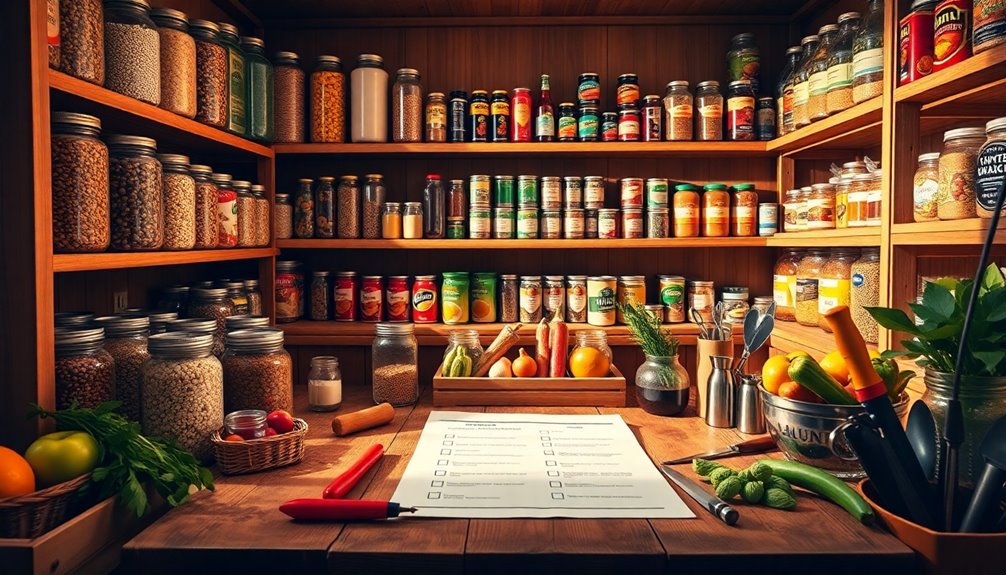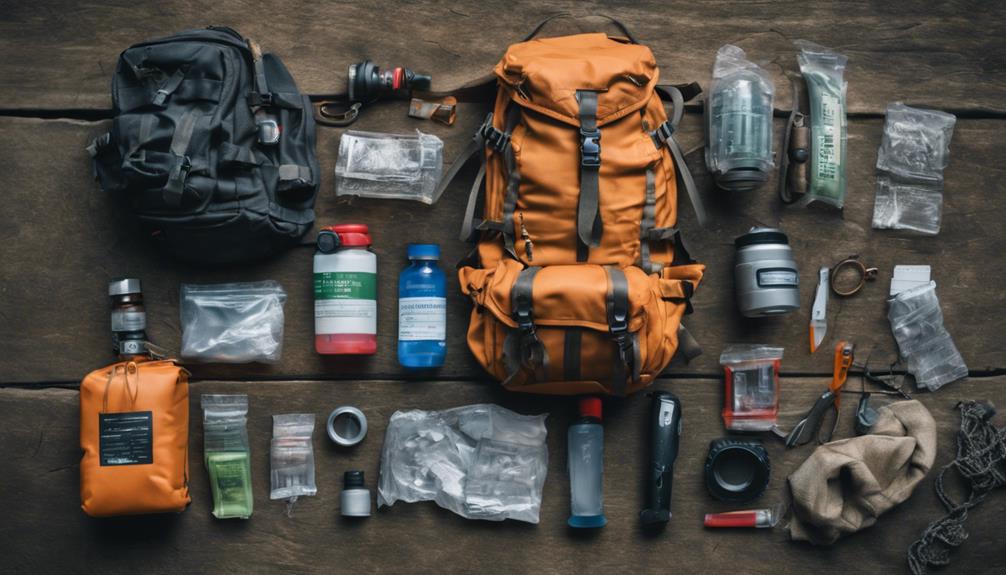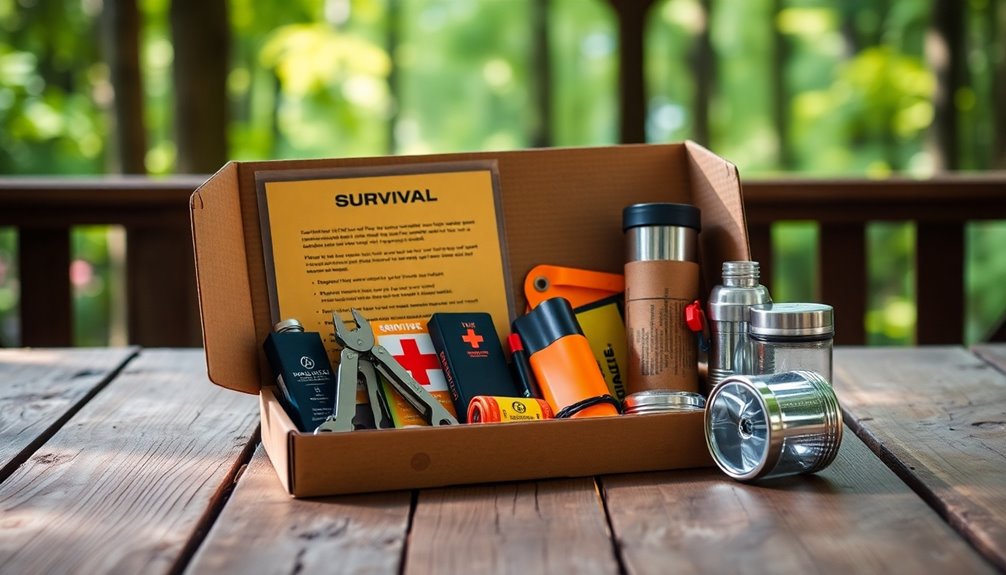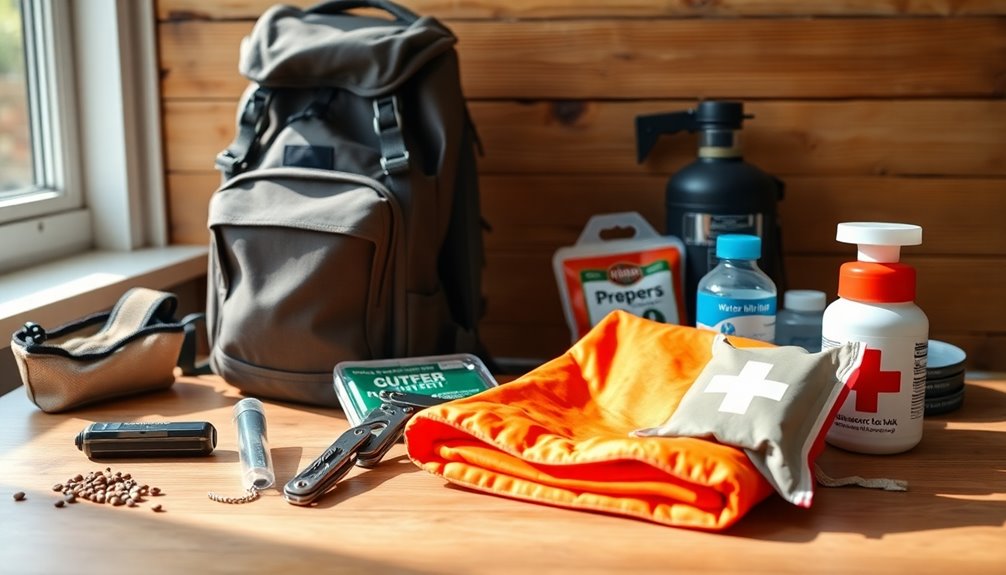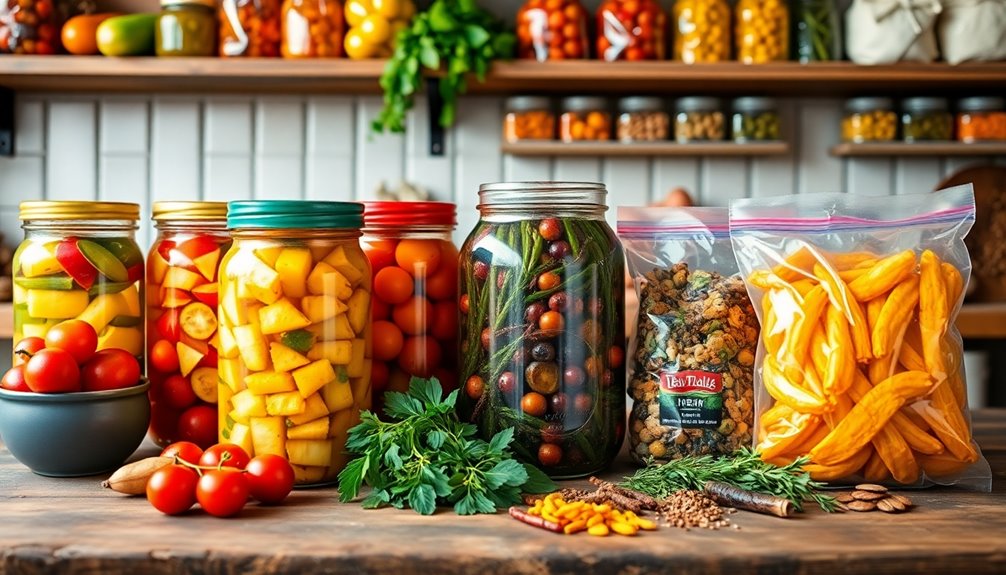You’re about to unlock an amazing prepper pantry list that’ll make your kitchen ready for any crisis! Start with essential foods like grains, beans, and canned goods. Don’t forget hydration—store plenty of clean water. Organize your space using labels and the FIFO method. If anyone in your home has special dietary needs, make sure to include suitable options. Finally, gather cooking essentials so you can prepare meals easily. It’s fun and exciting to create a pantry that’s both practical and safe! Keep exploring, and you’ll discover even more tips to make your kitchen a true crisis-proof haven! Include essential pantry foods like olive oil, spices, and condiments to add flavor and variety to your meals. Stock up on non-perishable snacks and comfort foods to lift spirits during challenging times. With a well-stocked prepper pantry, you can have peace of mind knowing that you have everything you need to sustain your family during unexpected events.
Key Takeaways
- Create a comprehensive list of essential food items including grains, beans, fats, and ready-to-eat foods for a well-stocked pantry.
- Implement proper water collection and storage methods to ensure a consistent supply of clean drinking water.
- Organize your pantry using the FIFO method and clear labeling to manage inventory effectively and minimize waste.
- Consider special dietary needs for family members, such as infants, the elderly, and those with allergies or diabetes.
- Equip your kitchen with essential cooking tools and alternative cooking sources to prepare meals during emergencies.
Essential Food Items
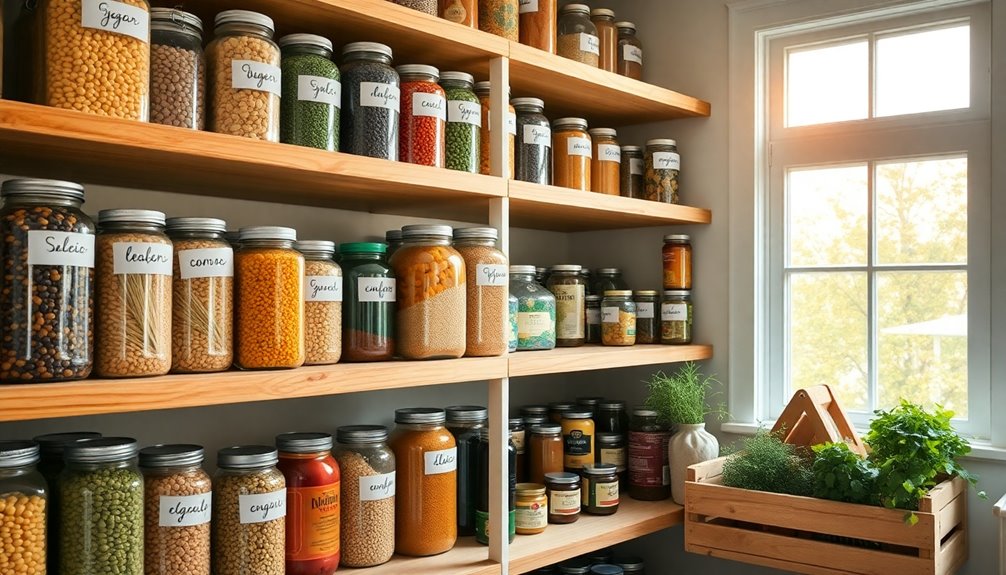
When it comes to building your prepper pantry, stocking essential food items is crucial for ensuring you have the nutrition you need during emergencies.
Start with grains and starches. Rice, whether long or short grain, is a great base for meals. Wheat berries and dried corn can add variety, while rolled oats and cornmeal are fantastic for breakfast and baking. Don't forget all-purpose flour for your baking needs! Shelf-stable foods, like pasta and sugar, can also help complement your grain options.
Next, stock up on beans and legumes. Pinto, black, navy, and kidney beans aren't only delicious but also packed with protein. Lentils cook quickly and are very nutritious, making them a perfect addition.
Fats and oils are also important. Keep lard, peanut butter, vegetable oil, olive oil, and coconut oil on hand. These not only enhance flavor but also provide energy.
Finally, have some ready-to-eat and high-energy foods. Canned meats, fruits, and vegetables are lifesavers. Canned juices and soups can be comforting, while peanut butter and jelly make quick snacks.
Crackers, granola bars, dried fruits, and nuts will keep your energy up. With these essentials, you're well on your way to a well-stocked prepper pantry!
Water and Hydration
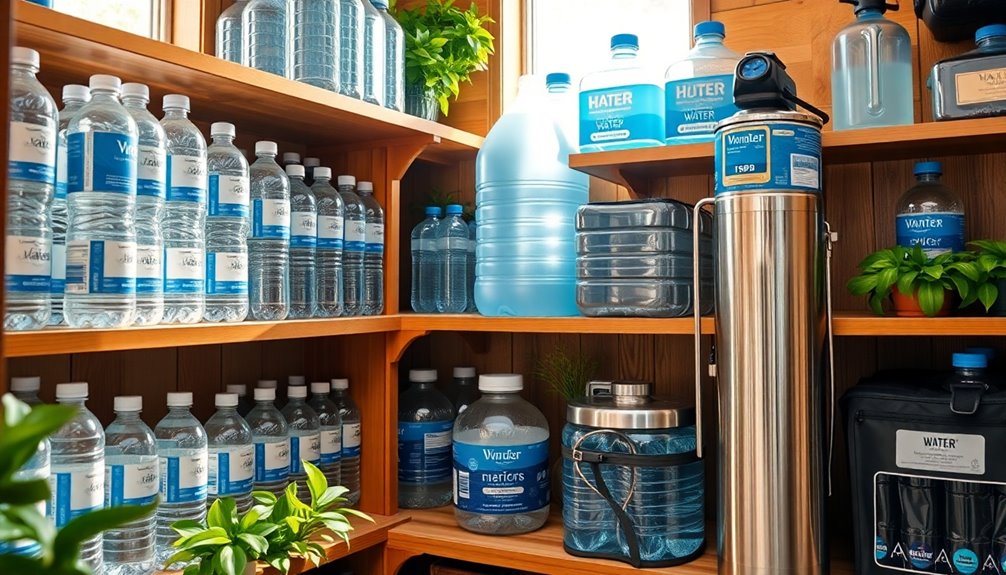
In emergency situations, having a reliable source of water is just as crucial as stocking food. Without water, you can't stay healthy or hydrated!
There are several fun ways to collect water. You might try rainwater collection using barrels to catch drops from your roof or dig a well if you live in a rural area. You could even invest in an Atmospheric Water Generator to pull moisture right from the air!
When it comes to storing water, you have plenty of options. You can use water bottles or jugs for short-term needs. For longer storage, consider big containers like water bricks or 5-gallon drums. BPA-free plastics are preferred for long-term storage to avoid chemical leaching.
Just make sure to use clean, food-grade containers to keep your water safe.
Purifying your water is super important, too! You can boil it to kill germs or use chemical treatments like bleach if boiling isn't an option.
Remember to seal your containers tightly to keep the water fresh. With these methods, you'll be ready to face any situation with plenty of hydration! Happy prepping!
Storage and Organization
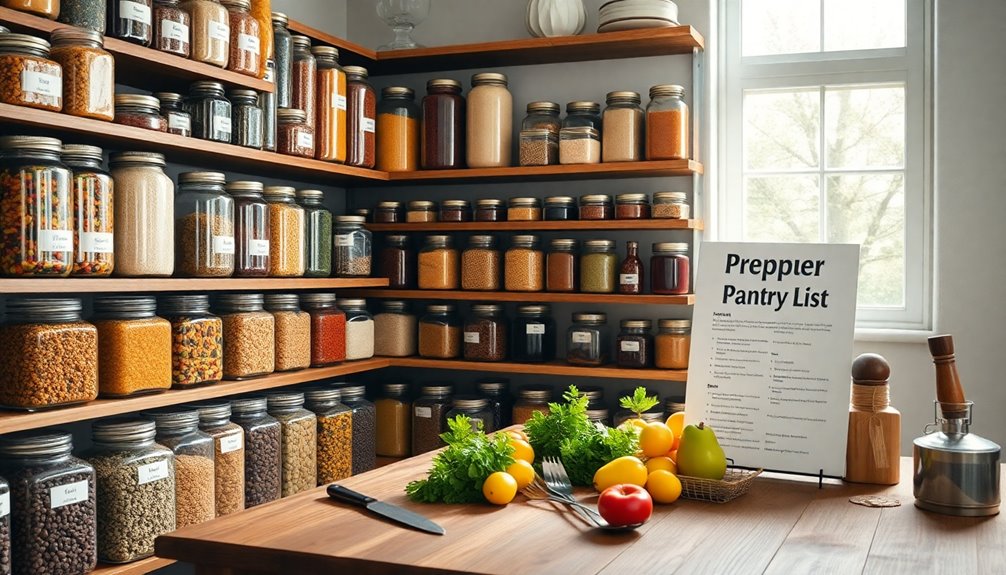
Effective storage and organization can make all the difference in maximizing your prepper pantry's efficiency. Start by utilizing every nook and cranny of your space. The cupboard under the stairs or an old closet can be perfect for storing supplies. You can even use the area beneath your bed with sliding shelves for cans! Additionally, a well-organized pantry contributes to emotional well-being, as a clutter-free environment can reduce stress and improve focus.
Next, implement the FIFO method, which stands for "First In, First Out." Store new items at the back and older ones at the front. This way, you'll use your supplies before they expire. It's also important to consider safety regulations for food storage, ensuring items are kept in appropriate conditions to prevent spoilage.
Labeling your items with expiration dates makes it easy to spot what needs to be consumed first. Additionally, ensure that you choose shelf-stable items to minimize spoilage, as this will help maintain the quality of your pantry over time.
Don't forget about vertical space! Use wall organizers and keep frequently used items at eye level for quick access. Color-coding supplies can also help you group similar items together, making your pantry look neat and organized.
Lastly, remember safety! Place heavier items on lower shelves to avoid accidents. Keep your storage area clean and well-maintained. With these practical tips, you'll enjoy a well-organized prepper pantry that helps you feel ready for anything!
Special Dietary Needs
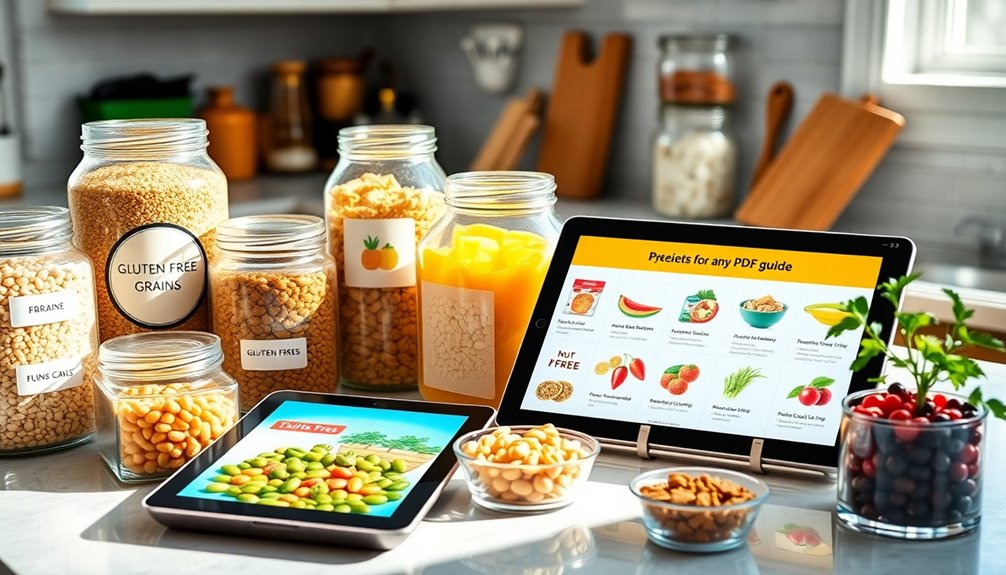
A well-organized prepper pantry not only accommodates your food supply but also addresses special dietary needs for different family members.
For infants, it's crucial to stock up on baby formula and a variety of canned or jarred baby food. Don't forget pureed fruits, veggies, and meats, along with necessary pediatric supplements. You'll also want to have plenty of bottles and nipples on hand.
For elderly family members, think about soft, easy-to-chew foods like canned fruits and vegetables. Protein-rich options, such as canned meats and beans, are essential too. Easy-to-prepare meals, like instant soups and oatmeal, can make mealtime easier. Comfort foods that are familiar and easy to consume can be a real treat! This approach can enhance community resilience by ensuring that individual preparedness is integrated into family planning.
If anyone in your family has allergies or intolerances, be sure to include gluten-free grains, nut-free alternatives like sunflower butter, and lactose-free options.
Stocking up on low-glycemic foods is important for diabetics, so include sugar-free snacks and protein-rich items.
With these considerations, your prepper pantry will be a welcoming space for everyone, ensuring all dietary needs are met during any crisis.
Happy prepping!
Cooking and Preparation Essentials
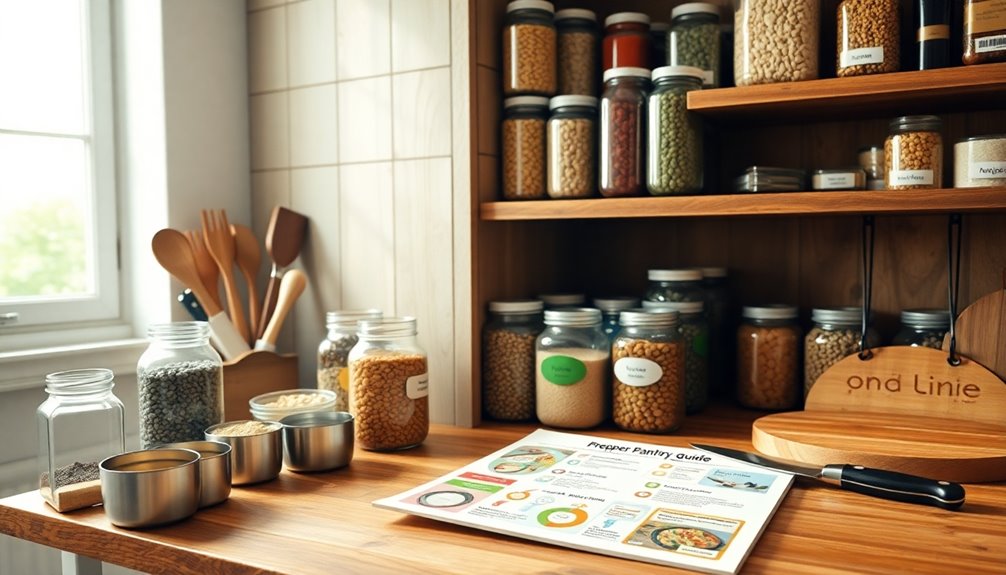
Gathering essential cooking and preparation tools is crucial for any well-stocked prepper pantry. You want to be ready for anything! Start with a manual can opener, cooking pots and pans, and some sturdy eating utensils like spoons, forks, and knives.
Don't forget a cutting board and a colander for draining those delicious meals you'll prepare. Regularly maintaining your cleaning tools ensures they function effectively when you need them most. Additionally, ensure that your cooking environment is well-ventilated to promote a cleaner air quality while preparing meals. Implementing effective preventive maintenance strategies can also help keep your appliances in top shape.
When it comes to cooking, consider alternative sources. Candle warmers, chafing dishes, and fondue pots can be handy when the power's out. If you're outdoors, charcoal grills and camp stoves are perfect for whipping up tasty dishes. You can even use your fireplace! Proper container sealing is also essential to maintain food quality and ensure safety during cooking.
Food safety is super important, too. Always keep your food in covered containers and make sure your utensils are clean. If something smells weird or looks off, throw it away!
Remember to check food temperatures with a refrigerator thermometer, and use a diluted bleach solution to disinfect cans before heating them up.
Frequently Asked Questions
How Do I Determine My Family's Food Storage Needs?
To determine your family's food storage needs, start by counting everyone in your household, including kids and their ages.
Think about any special diets or preferences. Next, figure out how much food to store per person, like grains, legumes, fats, and sugars.
Don't forget to check your pantry and freezer space! Finally, make a plan that fits your family's tastes and needs, keeping it fun and simple for everyone involved.
What Are the Best Ways to Preserve Food Long-Term?
To preserve food long-term, you've got some great options!
Freezing locks in freshness, but remember to blanch veggies first.
Dehydrating removes moisture, making snacks like fruit leathers and jerky.
Canning uses heat to keep foods safe and tasty for months.
If you want super long-lasting food, try freeze drying—this method can keep meals good for over 20 years!
Choose what suits you best, and enjoy your delicious, preserved creations!
How Often Should I Rotate My Pantry Stock?
You should rotate your pantry stock every six months to a year. This helps keep your food fresh and tasty!
Check expiration dates, using the oldest items first to prevent waste. If you live in a hot or humid place, rotate more often.
It's also fun to plan meals around what you already have. By keeping things organized and using the FIFO method, you'll always have delicious food ready to enjoy!
Are There Any Specific Storage Tips for Canned Goods?
When storing canned goods, you want to keep them in a cool, dark place, like a basement or closet.
Avoid areas that get hot or cold, like attics or garages.
Inspect your cans for dents or rust before you store them.
Use the first in, first out method to make sure you use the oldest cans first.
Finally, organize them neatly, so you can find what you need easily!
What Items Should I Prioritize for My Prepper Pantry?
When building your prepper pantry, start with grains and starches like rice and oats. They're filling and versatile!
Next, grab beans and legumes, which provide protein.
Canned goods are super important, too—think canned meats and veggies for easy meals.
Don't forget fats and oils like olive oil, plus some tasty snacks like nut butter and dried fruits.
These essentials will keep you well-fed and happy during any situation. Start stocking up!
Conclusion
Now you're ready to create your very own prepper pantry! With the right food, plenty of water, and a bit of organization, you can feel prepared for anything. Don't forget to consider special dietary needs and gather your cooking essentials too. It's all about making your kitchen a safe and happy place. So, grab your printable guide and start stocking up! You're on your way to a crisis-proof kitchen that keeps you and your loved ones secure!

